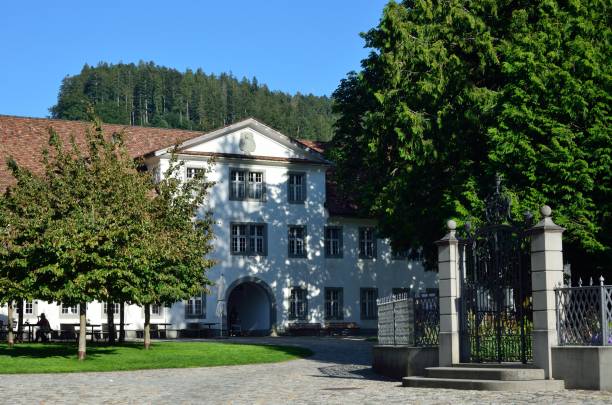Unveiling Excellence: A Guide to Top Universities in Switzerland for International Students
Switzerland, nestled amidst breathtaking mountains and picturesque landscapes, is a global leader in education. Internationally renowned universities offering exceptional academic programs, a multicultural learning environment, and a focus on innovation attract ambitious students from across the globe. For international students seeking a world-class education, Switzerland presents a unique opportunity to combine academic excellence with cultural immersion in a stunning natural environment. However, navigating the vast array of universities in Switzerland can be overwhelming. This comprehensive guide equips you, the aspiring international student, with the knowledge and resources to identify the best universities in Switzerland that perfectly align with your academic aspirations and career goals.
Understanding the Swiss Higher Education Landscape
Before diving into specific universities, it’s crucial to gain a foundational understanding of the Swiss higher education system. Here’s a breakdown of the key aspects:
-
Types of Universities: Switzerland boasts two main types of universities:
- Universities: These traditional universities offer a broad spectrum of undergraduate and graduate programs across various disciplines, including humanities, social sciences, natural sciences, engineering, and medicine. Examples include the University of Zurich, ETH Zurich (Swiss Federal Institute of Technology Zurich), and the University of Geneva.
- Universities of Applied Sciences (Fachhochschulen): These universities focus on professional and vocational education, offering bachelor’s degrees and Master’s degrees (Fachhochschulmaster) in applied fields such as engineering, business, information technology, and hospitality management. Universities of Applied Sciences have a strong emphasis on practical training and industry collaboration, preparing graduates for immediate employment in their chosen fields.
-
Language of Instruction: Universities in Switzerland offer programs in three main languages: German, French, and English. The language of instruction depends on the specific university and program. Many universities offer programs in all three languages, while others specialize in a particular language. Ensure you meet the language proficiency requirements (e.g., TOEFL, IELTS, DELF) for your chosen program and university.
-
Public vs. Private Universities: The vast majority of universities in Switzerland are public institutions offering high-quality education at relatively affordable tuition fees compared to other Western countries. However, there are a limited number of private universities with higher tuition fees but often smaller class sizes and a more personalized learning environment.
Ranking Considerations for International Students
While international university rankings like QS World University Rankings or Times Higher Education World University Rankings can provide a general overview, they shouldn’t be the sole factor when choosing a university in Switzerland. Here are additional considerations for international students:
-
Program Offerings: Identify universities that offer programs aligned with your specific academic interests and career goals. Explore program details, curriculum structure, and specializations within your chosen field.
-
Faculty Expertise: Research the faculty members in your chosen program. Look for professors with strong research credentials and expertise in your area of interest. A renowned faculty can significantly enhance your learning experience and research opportunities.
-
Student Support Services: International student support services are crucial for a smooth transition to studying in Switzerland. Evaluate the university’s resources for international students, including orientation programs, visa assistance, language support, and academic advising.
-
Location and Campus Culture: Consider the university’s location – urban setting, vibrant student life, or nestled in a picturesque town. Think about the campus environment and the overall atmosphere that best suits your learning style and preferences. Some universities offer a strong sense of community, while others might provide a more diverse and international environment.
-
Cost of Living: Factor in living expenses beyond tuition fees, including accommodation, food, transportation, and other necessities. Research the average cost of living in the university city and explore scholarship opportunities to help manage your financial obligations.
By considering these additional factors alongside university rankings, you can make a more informed decision and identify the best fit for your academic and personal needs.
Top Universities in Switzerland for International Students
Switzerland boasts a remarkable selection of universities consistently ranking high in global university rankings and attracting international students. Here’s a closer look at some of the top universities in Switzerland for international students:
-
Swiss Federal Institute of Technology Zurich (ETH Zurich): A global leader in science, technology, engineering, and mathematics (STEM) fields, ETH Zurich consistently ranks among the top universities worldwide. The university offers a rigorous academic environment, world-class research facilities, and strong industry connections, preparing graduates for successful careers in STEM disciplines. Programs are primarily offered in German, with some Master’s programs available in English.
-
École Polytechnique Fédérale de Lausanne (EPFL): EPFL mirrors ETH Zurich’s excellence in science and technology but is located in Lausanne, a French-speaking city. The university offers exceptional programs in engineering, computer science, architecture, and life sciences. French is the primary language of instruction, with some Master’s programs available in English.
-
University of Zurich (UZH): The largest university in Switzerland, UZH boasts a comprehensive range of programs across various disciplines, including humanities, social sciences, law, medicine, and natural sciences. UZH offers a strong international focus, with a significant portion of its student body coming from abroad. Programs are offered in German and English.
-
University of Geneva (UNIGE): Located in the heart of Geneva, a global center for international affairs, UNIGE offers a vibrant academic environment and a strong focus on international relations, law, humanities, and social sciences. French is the primary language of instruction, with some Master’s programs available in English.
-
University of Bern (UNIBE): The capital city of Bern plays host to UNIBE, a renowned university known for its research strengths in medicine, humanities, social sciences, and law. UNIBE fosters a collaborative learning environment and offers programs in German and English.
-
University of Lausanne (UNIL): Situated on the shores of Lake Geneva, UNIL offers a picturesque setting alongside a diverse range of programs in humanities, social sciences, law, and business. French is the primary language of instruction, with some Master’s programs available in English.
-
ETH Zurich (Swiss Federal Institute of Technology Lausanne): We apologize for this repetition. It appears there was a mistake while including information about EPFL.
-
École Polytechnique Fédérale de Lausanne (EPFL) (Continued): As mentioned earlier, EPFL is a leading institution for science and technology education. The university fosters a multicultural environment and offers strong support services for international students.
-
University of Basel (UNIBAS): Switzerland’s oldest university, UNIBAS, is known for its rich history and academic excellence in humanities, social sciences, life sciences, and medicine. The university offers programs in German and English.
Exploring Universities of Applied Sciences
Beyond traditional universities, Switzerland boasts a network of Universities of Applied Sciences (Fachhochschulen) offering career-oriented bachelor’s and Master’s degrees. Here are some of the top Universities of Applied Sciences for international students:
-
Zurich University of Applied Sciences (ZHAW): Located in the economic powerhouse of Zurich, ZHAW offers a diverse range of programs in engineering, life sciences, economics, and social sciences, with a strong emphasis on practical applications and industry collaboration. Programs are primarily offered in German.
-
Bern University of Applied Sciences ( Berner Fachhochschule BFH): BFH offers practical, industry-focused programs in engineering, information technology, architecture, and business administration across various campuses in Bern. Programs are primarily offered in German.
-
Geneva School of Business Administration (GSBA): Part of the Geneva University of Applied Sciences, GSBA provides internationally recognized bachelor’s and Master’s degrees in business administration with a focus on practical skills and career preparation. Programs are offered in English.
-
École hôtelière de Lausanne (EHL): A world leader in hospitality education, EHL offers prestigious bachelor’s degrees in hospitality management, preparing graduates for successful careers in the international hospitality industry. Programs are offered in English and French.
Additional Resources for International Students
Equipping yourself with the right resources is crucial for a successful application process. Here are valuable resources to explore:
- Swiss Universities Websites: Each university maintains a dedicated website outlining admissions procedures, program details, and information specifically for international students. Meticulously explore the websites of universities that interest you. Look for sections on “International Students,” “Admissions,” and “Programs” to gather comprehensive information about application requirements, language prerequisites, tuition fees, and scholarship opportunities.
- Swissuniversities: The official website of the Swiss Universities Rectors’ Conference provides a wealth of information about the Swiss higher education system, application procedures, and living in Switzerland as an international student.
- Study in Switzerland: The Study in Switzerland websites offers a user-friendly platform to search for universities and programs in Switzerland. Filter your search by program type, level of study (bachelor’s, master’s, Ph.D.), location, and language of instruction.
- Swiss Embassies and Consulates: Contact the Swiss embassy or consulate in your home country. They can provide guidance on visa applications, living arrangements, and the overall process of studying in Switzerland.
- International Student Forums and Online Communities: Connect with other international students considering studying in Switzerland through online forums and communities. These platforms can be a valuable source of advice, experiences, and insights from students who have already navigated the application process.
The Application Process
Once you’ve identified your target universities and programs, it’s time to delve into the application process. Here’s a general overview:
- Meet Application Deadlines: Application deadlines for international students can vary depending on the university and program. Ensure you submit your application materials well before the deadline to avoid missing out on consideration.
- Gather Required Documents: Typical application requirements include transcripts (translated and certified if necessary), standardized test scores (e.g., GRE, GMAT for some Master’s programs), a letter of motivation (personal statement), letters of recommendation, and proof of English or German language proficiency (TOEFL, IELTS, DELF).
- Craft a Compelling Personal Statement: The personal statement is your opportunity to showcase your academic achievements, research interests, and motivations for pursuing your chosen program. Tailor your statement to each university and program, highlighting relevant experiences and skills that make you a strong candidate.
- Demonstrate Language Proficiency: Meet the language proficiency requirements for your chosen program. Research the accepted language tests (TOEFL, IELTS, DELF) and ensure you achieve the required score.
- Prepare for Interviews: Some universities might require interviews as part of the application process. Practice your interview skills beforehand and be prepared to articulate your academic goals and reasons for wanting to study in Switzerland.
- Visa Application: If admitted, you’ll need to secure a student visa to study in Switzerland. Consult the Swiss embassy or consulate in your home country for detailed information on the visa application process and required documentation.
Funding Your Studies in Switzerland
The cost of living and tuition fees in Switzerland can be higher than in some other European countries. However, various scholarships and financial aid options can help ease the financial burden for international students. Here are some avenues to explore:
- University Scholarships: Many Swiss universities offer scholarships specifically for international students. Research the scholarship opportunities available at your target universities and explore their eligibility criteria and application procedures.
- Government Scholarships: The Swiss government and some cantonal governments (regional governments) offer scholarships for international students from specific countries or regions. Explore the websites of the Swiss Federal Office for Education and Science and the cantonal government of your chosen university’s location.
- External Scholarships: Numerous foundations, organizations, and private entities offer scholarships for international students pursuing studies abroad. Research scholarship opportunities relevant to your field of study, nationality, or academic background. Utilize scholarship search engines and online resources to identify potential funding sources.
- Financial Aid: Some universities offer financial aid programs based on need. Explore the financial aid options available at your target universities and inquire about eligibility requirements and application procedures.






